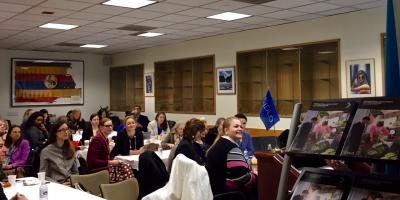
“Women’s participation is a matter of basic human rights and democratic principles. We cannot afford not to include women. This is not simply a question of what benefits women, but of what benefits the whole of society,” Ioana Liana Cazacu, Romanian Secretary of State for Gender Equality, told participants at a roundtable on women, business and the rule of law in New York .
The Bringing down the Barriers event explored issues of gender, business and law through the lens of the post-2015 development agenda and draft Sustainable Development Goals (SDGs).
World Bank Group research, presented at the session, showed that economies in every region of the world impose legal differences based on gender that impede women from achieving their full potential in their role as employees and/or entrepreneurs. Barriers range from restrictions on being head of household, opening a bank account, or getting a job without permission, to signing a contract or setting up a business; they include obstacles linked to maternity leave and childcare.
Ronnie Goldberg, Senior Counsel at the United States Council for International Business, echoed Ms. Cazacu’s words. The gender gap remains a reality for many, she said. “Women earn less and are less economically productive than men almost everywhere across the world. All too often laws, regulations, and institutions treat women differently, making it more difficult for them to earn an income, make decisions about property or start a business…. There can be no development when you ignore 50 % of your human resources.”
Flagging the cross-cutting nature of women’s empowerment and gender equality across the entire post-2015 development agenda, Sarah Iqbal from the World Bank Group stressed that these imperatives affected a variety of goals and targets essential to economic, social and environmental development.
The event was hosted by IDLO, the World Bank Group, the UN Global Compact, the International Chamber of Commerce and the United States Council for International Business, with the support of the governments of Paraguay and Romania. Panelists at the event, held on the margins of 59th session of the Commission on the Status of Women, included Cynthia H. Braddon, Vice President of International Affairs at McGraw Hill Financial, and Pilar S. Ramos, Executive Vice President and Associate General Counsel for North America at MasterCard Worldwide. Also in attendance were Somali Minister of Women and Human Rights Sahra Mohamed Ali Samatar and Paraguayan Vice Minister of Women’s Affairs Claudia Garcia, among various other government delegations.

